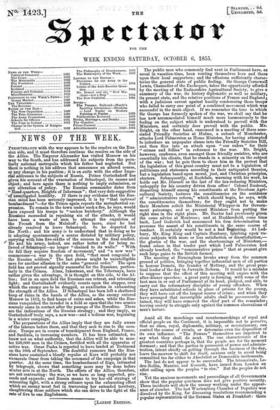NEWS OF THE WEEK.
PERSliVEILANCa with the war appears to be the resolve on the Rus- sian side, and it must therefore continue the resolve on the side of the Allies. The Emperor Alexander has visited Moscow on his way to the South, and has addressed his subjects from the pecu- liarly national metropolis which his father had neglected. But there is nothing in his address that announces an altered course, or any change in his position ; it is en suite with the other Impe- rial addresses to the subjects of Russia. Prince Gortschakoff has given his account of the evacuation of Sebastopol, its causes and object ; and here again there is nothing to imply submission, or any alteration of policy. The Russian commander dates from "Head-quarters, Heights of Inkerman" ; that very date suggestive of unmitigated hostility. If there is any evidence that the Rus- sian mind has been seriously impressed, it is by "that infernal bombardment "—for the Prince again repeats the metaphorical ex- pression. To remain in the town under such a fire, he says, would have exposed his troops to "useless butchery." Although the Russians succeeded in repulsing six of the attacks, it would have been a waste of men to attempt the expulsion of the Frenoh from the Malakoff ; the more, since he had already resolved to leave Sebastopol. So he departed for the North ; and his army is to understand that in doing so he is adopting spontaneously a course dictated by military policy, carrying with him five-sixths of the success in the final conflict. He and his army, indeed, are rather better off for being re- lieved of Sebastopol—no longer "chained to its walls." "With its fall they acquire freedom of movement," and "a new war" commences—a war in the open field, "that most congenial to the Russian soldiers." The last phrase might be unintelligible save for another allusion in the same "general order." The open field has not proved signally successful for the Russians, particu- larly in the Crimea. Alma, Inkerman, and the Tchernaya, have rather given the advantage, it is thought on this side, to the Al- lies ; but in an open field the Russians can retreat, and retreating fight ; and Gortschakoff evidently counts upon the steppes, over which the enemy are to be dragged, as auxiliaries in exhausting the strength of the Allies. If Sebastopol has been left a shattered heap of ruins in the hands of the Allies, so the enemy entered Moscow in 1812, to find heaps of ruins and ashes, while the Rus- sians vanquished the invader in a field so open that the two armies scarcely came in contact after the passage of the Borodino. These are the indications of the Russian strategy ; and they imply, as Gortschakoff truly says, a new war—and a tedious war, beginning in a winter campaign.
The preparations of the Allies imply that they are fully aware of the labours before them, and that they seek to rise to the occa- sion. Troops are in course of transhipment from England, France, and Sardinia, in increasing numbers. It has been estimated, we know not on what authority, that the Allies will be able to mus- ter 250,000 men in the Crimea, fortified with all the apparatus of active war. Omar Pasha is reported to have landed at Trebizond on the 10th of September. The doubtful rumours that the Rus- sians have sustained a bloody repulse at Kars will probably not exonerate Omar from taking the command of the campaign in that quarter. At the same time, the bombardment of Riga, intimated by telegraph, shows that something more may be done before winter Bets in at the North. The efforts of the Allies, therefore, are not contracting: the war, as we have so long expected, pro- ceeds and expands; and Russia means to try her old strategy of retreating fight, with a strong reliance upon the exhausting effect which an enemy must feel in traversing her extended territory, slaughtering those soldiers which she can drive to the fight at the rate of five to one Englishmen.


























